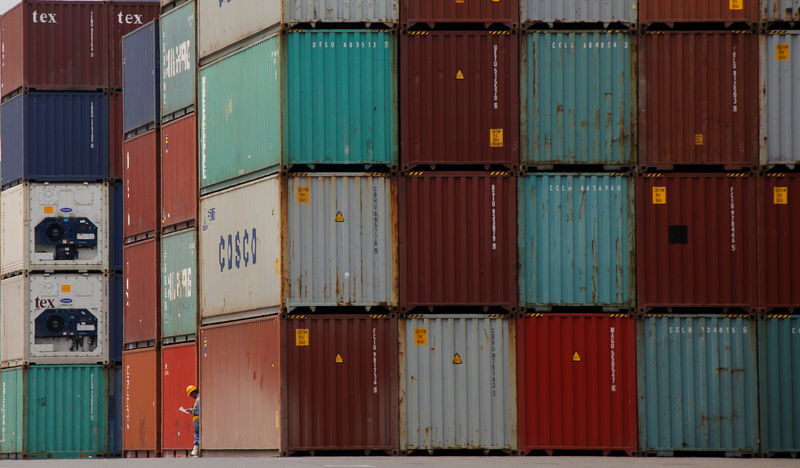 © Reuters. FILE PHOTO: A laborer works in a container area at a port in Tokyo
© Reuters. FILE PHOTO: A laborer works in a container area at a port in TokyoBy Tetsushi Kajimoto
TOKYO (Reuters) – Japan’s export growth slowed to a crawl in November as shipments to the United States and China weakened sharply, in a sign slowing external demand and a Sino-U.S. trade dispute may leave the economy underpowered over the next year.
The 0.1 percent year-on-year rise in exports undershot a 1.8 percent annual increase expected by economists in a Reuters poll, and was well below a 8.2 percent jump in October.
The trade data highlights rising external risks for Japan’s export-led economy, and comes as the Bank of Japan reviews policy at a two-day meeting that ends Thursday.
With consumer inflation remaining weak, the BOJ is widely expected to maintain its current ultra-easy policy.
Japan’s exports to the United States grew 1.6 percent year-on-year in November, led by shipments of airplane motors and semiconductor production equipment, slowing sharply from October’s 11.6 percent jump.
U.S.-bound auto exports fell 7.0 percent to 163,586 units.
U.S. President Donald Trump has criticized Japan as well as China over trade, threatening to impose steep tariffs on imports of Japanese cars, which make up about two-thirds of Japan’s $69 billion annual trade surplus with the United States.
Japan’s imports from the United States rose 8.1 percent in the year to November, led by feed corn, medicines and oil products, helping reduce its trade surplus with the U.S. by 5.4 percent on the year to 623.4 billion yen ($5.55 billion). It was marked the fifth straight month of declines.
Exports to China, Japan’s biggest trading partner, rose 0.4 percent in the year to November, slowing sharply from the previous month’s 9.0 percent annual gain. November’s increase was led by shipments of plastic materials, heavy oil and motors.
Shipments to Asia, which account for more than half of Japan’s overall exports, fell 1.9 percent in November, down for the first time in nine months.
Japan’s overall imports rose 12.5 percent in the year to November, roughly in line with the median estimate for a 11.5 percent annual increase.
The trade balance came to a deficit of 737.3 billion yen, versus a deficit of 600.3 billion yen expected by economists. It marked a second straight month of shortfalls.
Japan’s economy, the world’s third largest, contracted the most in over four years in the third quarter due to a series of natural disasters that hurt factory activity and supply chains.
Analysts expect a rebound in growth in the current quarter as temporary effects of natural disasters fade away, but trade frictions and slowing external demand cloud the outlook for the export-reliant economy.
Fusion Media or anyone involved with Fusion Media will not accept any liability for loss or damage as a result of reliance on the information including data, quotes, charts and buy/sell signals contained within this website. Please be fully informed regarding the risks and costs associated with trading the financial markets, it is one of the riskiest investment forms possible.
Source: Investing.com



























